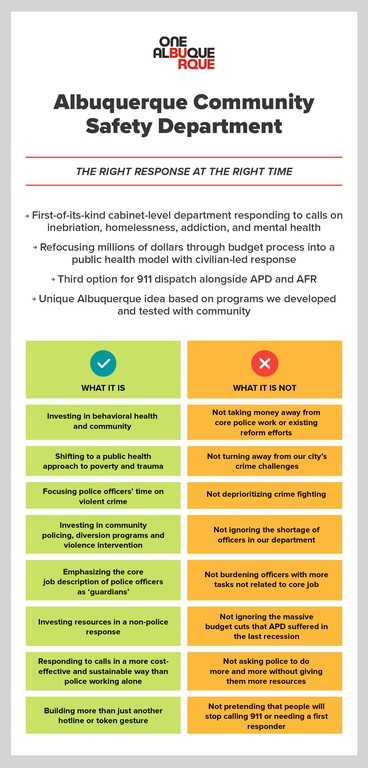
City Takes Community Input to Help Shape First-of-its-Kind Community Safety Department During Facilitated Input Sessions
New response department will transform City approach to homelessness, addiction and mental health; keep officers focused on core police work and reform efforts
September 5, 2020
At five facilitated online conversations this week, members of the public had an opportunity to participate directly in shaping Mayor Tim Keller’s groundbreaking community public safety department, Albuquerque Community Safety. The cabinet-level department, which will serve alongside the Albuquerque Police Department and Albuquerque Fire Rescue to deliver a public health approach to safety, was announced in June, and is part of the Mayor’s 2021 budget proposal that was sent to City Council this week.
“This is community-driven safety around a public health model for alternative response, and it has not been done before—so it’s essential that the public be a central part of shaping what that looks like,” said Mayor Tim Keller. “Through our community safety department, we’re addressing the underlying issues that can lead to crime in our community, and investing real resources in a non-police response to common challenges.”
The facilitated sessions are in addition to an open community survey that has seen more than 2570 responses. The new department is the culmination of two years of preliminary work to change the way Albuquerque handles public safety, and comes amid nationwide calls to move resources away from armed police response as a one-size-fits-all answer.
Albuquerque Community Safety (ACS) will include trained professionals such as social workers, housing and homelessness specialists, violence prevention and diversion program experts. The department will give 9-1-1 dispatch an option when a community safety response is more appropriate than a paramedic, fire-fighter, or armed police officer.
The City will be working with community members, experts and City Councilors over the next two months to map out the details of the department, which has a proposed initial budget of $7.5 million. These efforts will bolster expanded investments in violence intervention, diversion programs and treatment initiatives.
Mariela Ruiz-Angel, who is leading the launch of the department, said, “The community is united around the idea that in many cases, a non-police response, equipped with the right resources and expertise, is more appropriate. What we’re learning in these community conversations and from our survey is how the new department can zero in on the needs of our city and how we can start to decriminalize behavioral and mental health issues.”
Results of the survey and input sessions will be available in October. For questions or to schedule a facilitation for your program or agency please contact [email protected].
###

